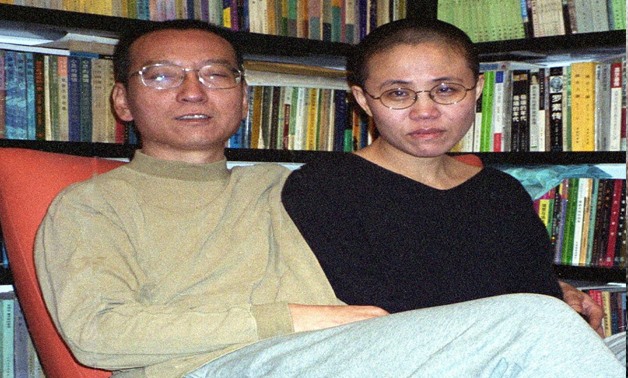
The US is leading calls for Chinese dissident Liu Xiaobo and his wife Liu Xia to be given freedom to move and seek treatment (AFP Photo/Handout)
Beijing - 27 June 2017: China on Tuesday rejected criticism over its treatment of cancer-stricken Nobel laureate Liu Xiaobo after the United States urged Beijing to give the paroled activist freedom to move and choose his own doctors.
The US embassy in Beijing joined a growing chorus of Chinese human rights lawyers and activists demanding Liu's unconditional release amid concerns about his wellbeing.
With three years left to serve in his 11-year sentence, the 61-year-old democracy campaigner was granted medical parole days after being diagnosed with terminal liver cancer on May 23, his lawyer Mo Shaoping said.
The US embassy said Tuesday it was "working to gather more information" about Liu's legal and medical status after authorities confirmed his transfer from prison to a hospital in northeast China.
"We call on the Chinese authorities to not only release Mr Liu but also to allow his wife Ms Liu Xia out of house arrest," spokeswoman Mary Beth Polley told AFP.
Liu Xia, a poet, has been under house arrest since 2010, when her husband won the Nobel prize. She suffered a heart attack in 2014, when she was also diagnosed with depression, a rights group said at the time.
Su Yutong, a Chinese activist exiled in Germany, shared a video on Twitter showing Liu Xia sobbing during a video call with a friend and saying her husband "can't have surgery, can't do chemotherapy".
Friends of the couple told AFP that Liu Xia has been allowed to visit him at the hospital.
China should "provide them the protection and freedom such as freedom of movement and access to medical care of his choosing to which they are entitled under the Chinese constitution and legal system and international commitments," Polley said.
But China's foreign ministry hit back, saying "no country has the right to interfere and make irresponsible remarks on Chinese internal affairs".
"China is a rule-of-law country, where everybody is equal in front of the law. Any other country should respect China's judicial sovereignty, and shouldn't use individual cases to interfere," spokesman Lu Kang told a regular briefing after being asked about the US statement.
US-based Dui Hua Foundation rights group said a person granted medical parole in China was not "free or released" -- they would be "supervised by local public security bureaus".
Under Chinese law, it said, medical parole lasts six months after which the person's condition is assessed. Depending on the result, parole can be extended or the person sent back to prison to serve the rest of their sentence.
- 'Sentenced him to death' -
Hundreds of Chinese lawyers, activists and friends signed a petition calling on authorities to give Liu "complete freedom" and allow his wife to "have contact with the outside world".
They also demanded Liu be allowed to choose where he receives medical treatment and for authorities to carry out a "thorough investigation" into the circumstances that led to the deterioration of his health.
Wu'er Kaixi and Wang Dan, former student leaders at the 1989 Tiananmen democracy protests who now live overseas, also posted a joint statement on Twitter saying China had "deliberately sentenced him to death".
Prison authorities said Monday Liu was being treated by "eight renowned Chinese oncologists" at China Medical University No 1 Hospital in the northeast city of Shenyang.
But international human rights groups and supporters demanded that Liu be granted the best medical care in China or abroad and criticised his treatment.
Citing two other cases of critics who died in detention, Human Rights Watch's China director Sophie Richardson said the government "needs to be held to account for permitting yet another peaceful critic to fall gravely ill while unjustly detained."
- History of arrests -
The writer was sentenced in 2009 for "subversion" after spearheading a bold petition for democratic reforms.
He was awarded the Nobel prize while in jail a year later and was represented by an empty chair at the ceremony in Oslo.
Liu is one of only three people to have won the Nobel award while jailed by their own government.
China strongly condemned the prize as foreign interference in its internal affairs.
Liu was arrested in 2008 after co-writing Charter 08, a petition posted online that called for the protection of basic human rights and reform of China's one-party Communist system.
Liu is also known for his efforts to help negotiate the safe exit from Tiananmen Square of thousands of student demonstrators on the night of June 3-4, 1989 when the military bloodily suppressed six weeks of protests in the heart of Beijing.


Comments
Leave a Comment